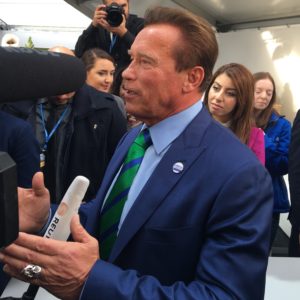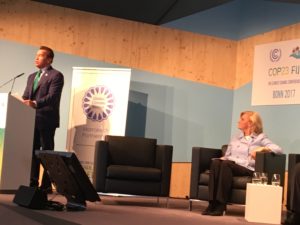The 2017 UN Climate Change Conference, which takes place 6-17 November in Bonn, Germany, brings together diplomats, ministers and heads of state from virtually all UN member states as well as UN representatives and civil society. This year’s United Nations Framework Convention on Climate Change (UNFCCC) conference is co-hosted by Fiji with the support of the government of Germany, which is staging the conference in Bonn.
One major highlight of the conference was the Health Actions High Level Event on 12 November. During this event, governors of the four U.S. Climate Alliance States — California, Washington, Oregon and Virginia — met to explore the challenges and potential of states’ action on climate change. The governors who took part are Edmund G. Brown Jr. (California), Jay Inslee (Washington), Kate Brown (Oregon) and Terry McAuliffe (Virginia).
 Keynote speaker Arnold Schwarzenegger, the former governor of California and one of the United States’ top leaders on climate action, addressed the forum with a rousing speech challenging activists to transform their messaging around climate change.
Keynote speaker Arnold Schwarzenegger, the former governor of California and one of the United States’ top leaders on climate action, addressed the forum with a rousing speech challenging activists to transform their messaging around climate change.
By drawing the connection between air pollution and climate change, Schwarzenegger argued, activists can help people understand that improving air quality will have huge positive effects on their health today… and not just in the future. As Schwarzenegger pointed out, the facts around air pollution are dire. “25,000 people are dying every day because of pollution. 25,000! It’s a matter of fact that while I am standing here speaking today, another thousand will die because of pollution.”
But Schwarzenegger believes that climate activists have failed to communicate these high stakes. “No one is talking about what is happening today,” he said. “There aren’t enough meetings about what is happening right now. There aren’t enough speeches about people who are dying today because of pollution. There aren’t enough conferences about people who die from cancer because they live too close to the freeway or to a port. There aren’t enough conferences that talk about the kids developing asthma and having breathing problems and having to use an inhaler.”
To change the conversation around climate and clean air, Schwarzenegger suggested a new rule: “A rule that says, that no one from now on is allowed ever to speak about the environment unless they include one page about the statistics of our health problems because of pollution.”
The former governor’s speech was met with enthusiastic applause, suggesting broad support for a campaign that links better air quality with both a stable climate and healthier future. 
Watch Schwarzenegger’s full keynote address here.
The conference will continue to meet over the next few days, exploring a broad selection of issues on climate, clean air and public health, along with moving forward on the Paris Agreement. The conference is particularly focused on the the risk climate change poses to Small Island Developing States, which are especially vulnerable to extreme weather events and rising sea levels caused by climate change.
“Small Island Developing States are ready to take leadership towards green, resilient and health-promoting national development – but the support of the international community is essential,” said Dr Joy St John, recently appointed Assistant Director-General for Climate and Other Determinants of Health at WHO.
Patricia Espinosa, Executive Secretary of the United Nations Climate Change Secretariat, said, “To meet the climate change and sustainable development challenge, everyone must be empowered to contribute. We all have a role to play, and COP 23 will shine a light on both action underway and the many possible actions every individual and institution can take moving forward.”